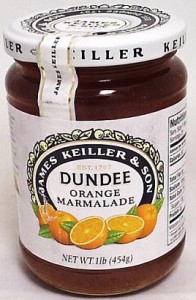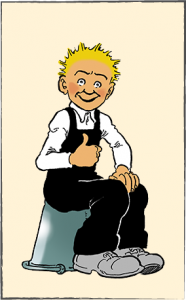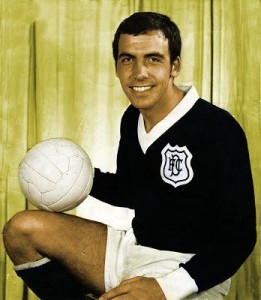Football crazy? Or how to help young children to talk, and get involved with role play. With help from The Jam and David Bowie!
Date posted: Friday 18th September 2015
Dundee. What does that word mean to you? A type of cake, maybe? A city in Scotland? The birthplace of marmalade? (According to legend a Mrs Keiller invented marmalade in Dundee in 1797 and exported it all over the globe.) The place where more jute was manufactured than any other place in the world? The city of journalism, where DC Thomson & Co produce such legendary titles as Sunday Post, The Broons, Oor Wullie, The Beano and The Dandy?
 Jute |
 Jam… |
 …and Journalism? |
By the time I first visited Dundee in 1973, there was only one ‘J’ left out of the original ‘Three Js’. The jute industry had died a death in the 1960s and the jam had long been made ‘doon sooth’ (though rumour has it that Paul Weller had an auntie in the city, who suggested that he call his new band ‘The Jam’, as a nod towards Dundee’s industrial heritage.) The journalism was still going strong, and today you can still see grown men queueing up in the wee small hours of a Thursday outside DC Thomson’s, in the hope that they will be the first to get their hands on the latest Dandy, or even Scottish Weddings magazine.
The Jam
For me, Dundee will always be synonymous with football (or as they call it up there, ‘fitba’).It’s one of those towns with two football teams, and as a result, it’s the most talked about topic all over the city. I was 15 in 1973 and was visiting my friend Mark, who was a loyal Dundee FC fan. (Fan comes from the word fanatic, and he certainly was, still is and always will be, one of those.) We had paid good money to stand up in the pouring rain for 90 minutes in Dens Park, Dundee’s ground, to see The Dees play Motherwell. We had a great view from the back of Dens Park’s equivalent of Chelsea’s ‘Shed’ (and what was going to be called Man City’s ‘Bell End’ in honour of Colin Bell, but whose name was changed at the last minute. I’m not sure why. Answers anyone?)
I loved the atmosphere as, along with hundreds of others, we stomped our feet on the sheets of corrugated iron that made up the back wall of the stand while singing the praises of the footie heroes of the day (and jeering at one of our former heroes who had recently signed for Motherwell). But I was a bit concerned at just how low some of the iron girders were above our heads. A fellow fan could read the anxiety on my face: ’Aye laddie. Ye’ll need tae be careful when we score a goal. If ye jump up too high ye’ll brain yersel’
 David Bowie |
 Jocky Scott. Click the photo to see him in action! |
Mark had two role models in life: David Bowie and the Dees legendary forward Jocky Scott.
We were there to watch Dundee FC annihilate Motherwell, and to see Jocky Scott score a hat-trick. By half time, nothing very exciting had happened, apart from some woeful passing and the goalies occasionally hoofing the ball high in the air towards the other team’s half, so that two opposing players could leap up to head the ball, try and barge each other out of the way, only for them to ‘bump heads’, and spend five minutes being ministered to by the team physios, who raced onto the pitch, each swinging an orange bucket containing freezing water and a ‘magic sponge’.
We had been able to ‘get served’ in a local bar before the match, but my hastily-downed two pints of McEwan’s export were taking their toll on my bladder. ‘Just use this can’ advised Mark, ‘after I’ve emptied its contents into me mooth, of course!’ (He had managed to secrete a can of Norseman Lager on his person and quickly drained it so that I could smile again.)
Three minutes before half time all hell broke loose. Dundee scored, Mark jumped up and banged his head against an iron girder and was out cold. Luckily he missed the frenzy that followed the referee deciding that the goal was offside. People were going berserk all around us, as the air turned blue with the foulest language I have ever heard aimed at any human being, apart from a referee, of course. It made The Two Minute Hate from George Orwell’s 1984 look like Songs of Praise. This game was finally living up to our expectations! Once the hooha had died down, nearby fans turned their attention to poor Mark, who was still lying sparko on the ground. One Dees supporter, who was a bit worse for wear, came to the rescue. ‘Quick laddie, pass me that can you’re hoddin’ and I’ll revive him wi’ a wee drop o’ the strong stuff.’ Before I could say, ‘urea’ The Good Shamaritan grabbed my can. ‘Jings, it’s awfa warm. I can see steam comin’ aff it!’ Florence Nightingale observed, as he tilted Mark’s head back and began pouring some of my liquid waste down his throat. ‘Mebbe we should splash it all over his face, just to be on the safe side’ his mate advised. So they poured the remaining amber-coloured liquid over Mark’s head and began slapping him.
What seemed like routine First Aid to us must have looked like an outbreak of violence on the terraces to the people below us, because before I could shout, ‘Gerrof me officer, I’m innocent!’ we were pounced on by a very enthusiastic group of policemen. As luck would have it, there was a nurse nearby, who rushed over and explained what had happened, and began to vigorously administer mouth-to-mouth to Mark. This miraculously brought my friend spluttering back to life.
As we trudged homewards (via the chip shop) after the game, I asked Mark what he thought of the match (it was a nil-nil draw.)‘Nae bad,’ was his response, ‘can ye get me some salt and vinegar on ma chips to see if I can get rid o’ this awfa strange taste in ma mooth? That nurse must ha’ bin oan the Irn Bru before he gave me that kiss.’ (For those of you unfamiliar with Scotland, Irn Bru is a popular sugary drink).

Many people are passionate about football. But there are as many people who, at worst, hate the game with a passion or, at best, say things like, ‘I can’t see the point of grown men running round after a ball and trying to kick it between two pieces of wood.’ I myself, even after Dundee’s performance, am not too struck on Britain’s national sport. But if a small child comes up to me and asks me to play footie with him, I am definitely going to oblige!
As someone who will do anything to get young children talking, I know that children talk most and best about WHAT THEY ALREADY KNOW. The topic that will be most popular for any young child is ‘What Happens in My Family’. If a child comes from an ‘Arsenal family’ then they will have lots to say about being a ‘Gooner’. It’s possible that mum and dad will be huge fans and that there will be lots of talk about Arsenal, loads of Arsenal merchandise in the home and probably lots of singing about the family’s favourite club.
This is the family’s culture, and it is important for us to find out about it. Many two-year olds in particular are vulnerable when away from home, because they find it difficult to make themselves understood. This is particularly true when they are talking about something out of context, such as ‘What I do with my family’. The same applies for older children with speech and language difficulties and those in the early stages of learning English as an additional language. If we know that a child comes from a family that loves football, then playing football with the child and talking about the game can be a great place to start a conversation.
And football has a huge vocabulary and can be perfect for introducing lots of rich language, like corner/foul/off/goal!/penalty/kick/score/throw/catch/we was robbed/oi ref that was in no way offside etc. (I was only joking about the last two examples). And if you want to involve children in role play, then play a game of football. Children love to ceremoniously take a red card out of their top pocket and send someone off, or hover on the edge of the penalty area and suddenly fall over when approached by an opposing player. It really is role play, and just as valid an activity as playing in the home corner.
The starting place for anyone who wants to talk to children about football is to find out something about the game. What better place to start than Bend it Like Beckham?
It’s offside when the French mustard has to be between the teriyaki sauce and the sea salt.
Playing football is all about having a laugh. Really. We don’t need to focus on the spitting, swearing, fighting, petulant behaviour (of the fans as well as the players). Don’t just take my word for it, read an article by an established authority on children’s language development.
Take care out there
Michael
https://www.youtube.com/watch?v=j4xoxFrRA2Q
Sign up for Michael's weekly blog post by clicking here!
Leave a Reply